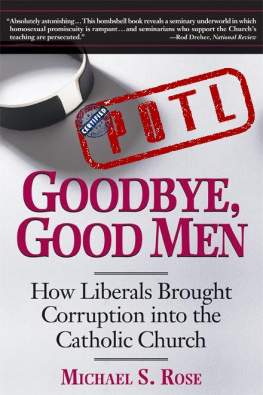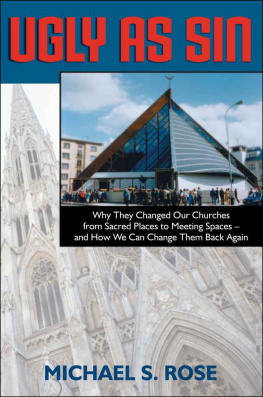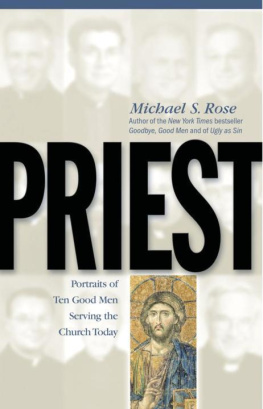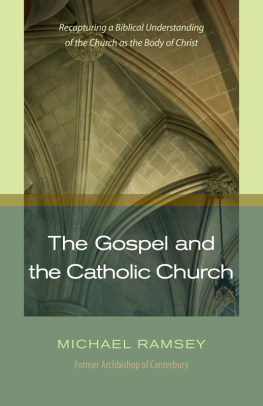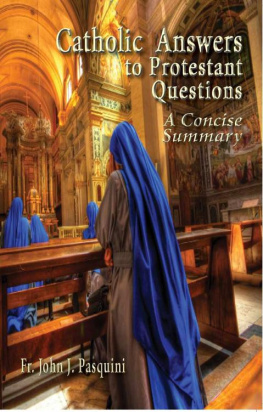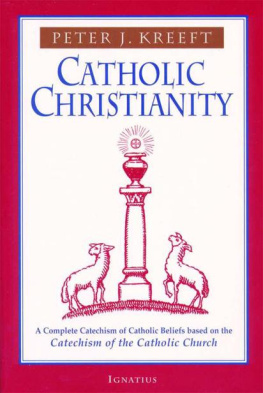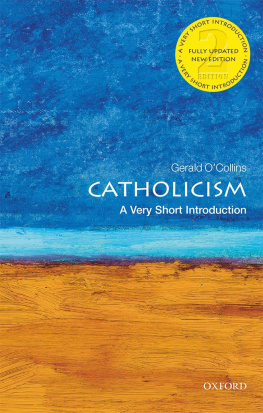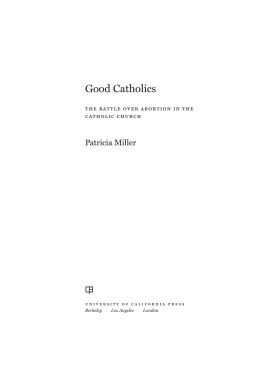


Copyright 2002 by Michael S. Rose
All rights reserved. No part of this publication may be reproduced or transmitted in any form or by any means electronic or mechanical, including photocopy, recording, or any information storage and retrieval system now known or to be invented, without permission in writing from the publisher, except by a reviewer who wishes to quote brief passages in connection with a review written for inclusion in a magazine, newspaper, website, or broadcast.
Regnery is a registered trademark of Salem Communications Holding Corporation
First ebook edition 2015
eISBN 978-1-62157-427-9
First paperback edition, published in 2015.
The Library of Congress has cataloged the hardcover edition as follows:
Rose, Michael S., 1969-
Goodbye, good men : how liberals brought corruption into the Catholic Church / Michael S. Rose.
p. cm.
Includes bibliographical references and index.
1. Vocation, Ecclesiastical. 2. Liberalism (Religion)Catholic Church. I. Title.
BX2380 .R67 2002
262.14273dc21
2002006033
Published in the United States by
Regnery Publishing
A Division of Salem Media Group
300 New Jersey Avenue NW
Washington, DC 20001
www.Regnery.com
Manufactured in the United States of America
10 9 8 7 6 5 4 3 2 1
Books are available in quantity for promotional or premium use. For information on discounts and terms, please visit our website: www.Regnery.com.
Distributed to the trade by
Perseus Distribution
250 West 57th Street
New York, NY 10107
Contents
In the months before this book went to press, Catholics throughout the United States were scandalized by one revelation after another about sexual abuse among the Catholic clergy. First came word of the notorious crimes of John Geoghan, a defrocked priest of the Archdiocese of Boston who stood accused of more than 130 counts of sexual molestation in a thirty-six-year spree. He has thus far been sentenced to eight years in prison. If Geoghans recidivist crimes werent awful enough, the following week the archbishop of Boston, Bernard Cardinal Lawunder mounting pressure from the Massachusetts attorney generalrevealed the names of other priests or former priests of his archdiocese who had been accused of sexual misconduct with minors. Then a Missouri man alleged that Bishop Anthony J. OConnell had sexually abused him while he was a seminary student. He also filed a federal racketeering suit accusing the Catholic Church in the United States of a pattern of illegal activitya systematic cover-up of sexual crimes by Catholic priests.
The sexual crimes were horrible enough, but most shocking was this pattern of cover-upthe fact that Church officials knowingly protected repeat sex offenders and routinely reassigned them to posts that gave them access to new victims. Commentator (and Catholic) Patrick J. Buchanan likened the situation to Mafia dons providing safe houses for their henchmen. Such an analogy isnt off the mark considering that Bishop James Quinn of Cleveland, in response to the racketeering suit, suggested that Church leaders should
Despite the media feeding frenzy, Church officials still hesitated to come clean. Although Bostons Cardinal Law released the names of the offending priests to law enforcement officials, he would not reveal to the media the number of priests involved. Only by examining court documents and speaking with local law firms did the Boston Globe discover that the archdiocese had settled sex abuse claims against at least eighty priests during the previous decade alone. That number would later swell to nigh a hundred.
Laws attitude seemed characteristic of far too many American bishops, who often seem to believe that they and their priests are answerable to no greater authority than themselves. Indeed, we are finding that what happened in Boston is routine in many dioceses; similar grave problems have been revealed in Philadelphia, Los Angeles, St. Louis, Brooklyn, Milwaukee, Cleveland, and Pittsburgh, to name just a few. The fact is, orthodox Catholics are demanding honest and forthright action from the Churchs shepherds.
The big question now is: Why is this happening? The extent of the sex abuse scandals and the accompanying payoffs and cover-ups has mystified many of the faithful, who are simply at a loss to understand how this could have occurred and why it was swept under the rug for so long.
I researched and wrote this book over the past two years, interviewing more than 150 people, as a professional investigative journalist for the Catholic press, without any idea that the Boston debacle and its many ramifications would blow up just as Goodbye, Good Men was going to press. Although I did not set out to write a book about clerical sex abuse, what I discovered provides at least part of the answer to the burning question: How could this have happened?
Goodbye, Good Men presents documented evidence that the root of this problemthe cover-up and the sexual scandals themselvesextends down to the very place where vocations to the priesthood germinate: the seminary. Too often men who support the teachings of the Church, especially the teachings on sexual morality, are dismissed for being rigid and uncharitable homophobes, while those seminarians who reject the Churchs teaching or come out as gays to their superiors are given preferential treatment and then ordained to the Catholic priesthood. A corrupt, protective network starts in many seminaries where gay seminarians are encouraged to act out or explore their sexuality in highly inappropriate ways.
No doubt, for the average American, Catholic or not, much of the material presented in this book will come as a surpriseeven a shock. Nevertheless, as one recently ordained priest confided in me after reading the prepublication manuscript, the revelations herein have long been known within the inner circles of the Catholic Churchamong bishops and priests especially. The problem in vocations offices and in seminaries is a profound spiritual problem, a sickness of untold proportions. This is a book that seeks first to identify that sickness, or at least a portion of it, in hopes that the pathogen can be removed and the body healed. In short, many have hijacked the priesthood in order to change the Catholic Church from within.
The trouble starts in the seminary, and gross sexual immorality and the protective network formed around that immorality is only one of the major issues that needs to be forthrightly addressed by the shepherds of the Catholic Church, as Goodbye, Good Men reveals. The fact is that many qualified candidates for the priesthood have been turned away for political reasons over the past three decades. Systematic, ideological discrimination has been practiced against seminarians who uphold Catholic teaching on sexuality and other issues; dissenters from Catholic teachingincluding teaching on homosexualityhave been rewarded.
Goodbye, Good Men exposes this corruption: the deliberate infiltration of Catholic seminaries by what Andrew Greeley has dubbed
Next page
